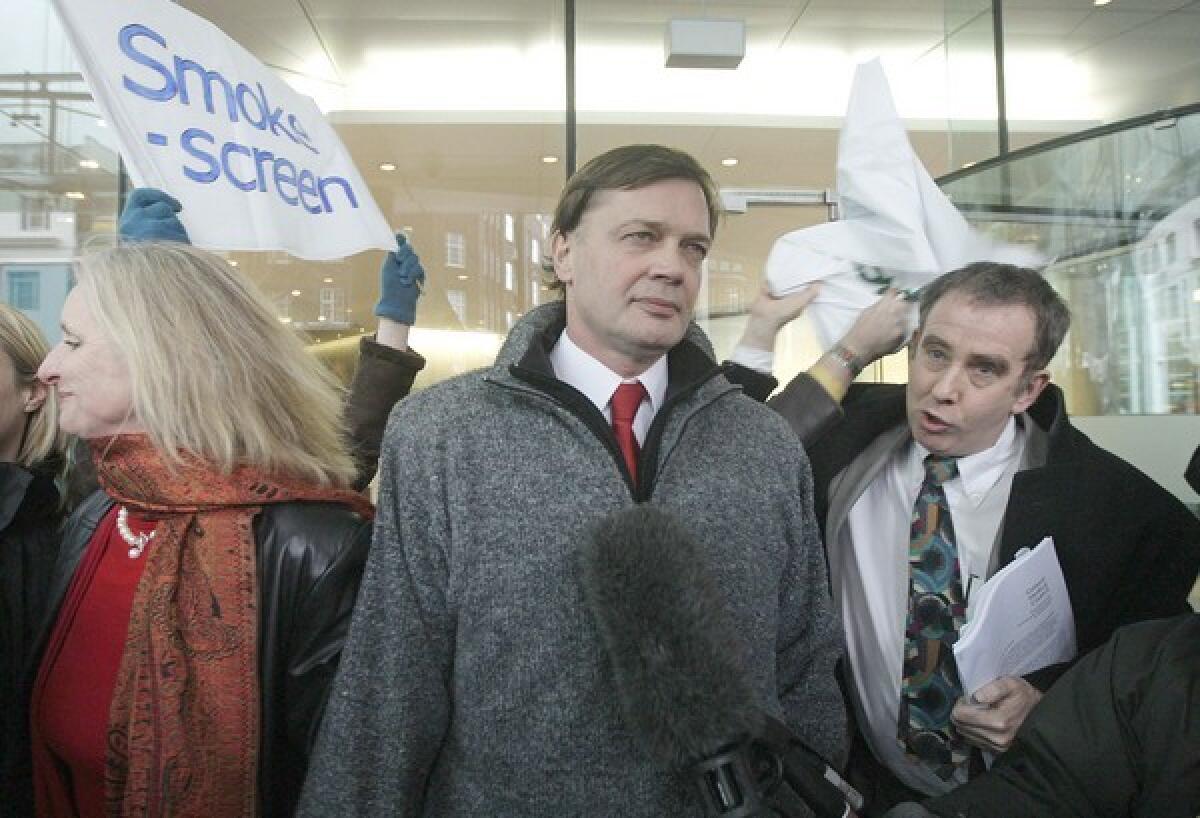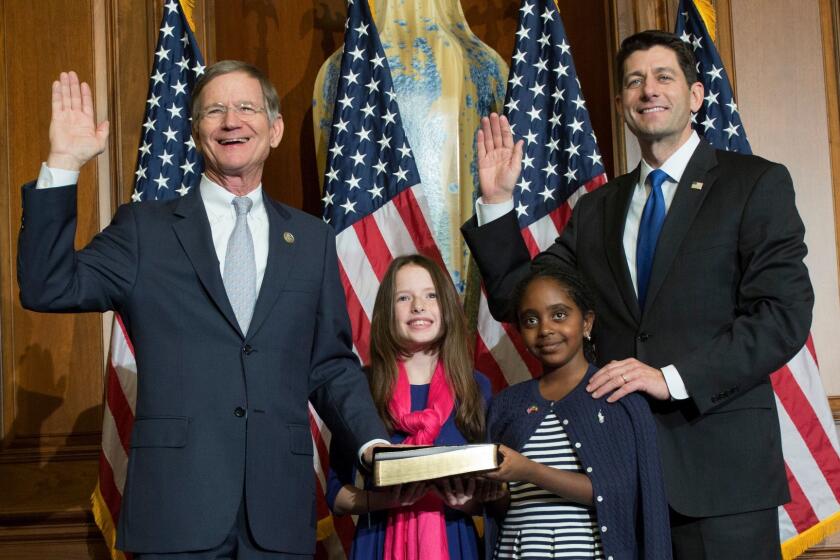Column: Why I never ‘agree to disagree’ — I just tell you when you’re wrong

- Share via
Is there a more weaselly dodge in the English language than the phrase “let’s agree to disagree”?
On the surface it’s an offer to set aside one’s differences in the name of civility. Most often, however, it’s a confession of defeat by someone attempting to wriggle out of a losing argument by abandoning the contest and asking for a draw.
That’s why I won’t “agree to disagree.” Sometimes I’ll merely disagree. And sometimes I’ll see off rivals with the observation that they’re wrong, that I’ve amply documented their error, and that their offer to “agree to disagree” is an implicit admission that their position is groundless, not to say dishonest.
Revealed truth is the one weapon stupidity’s got against intelligence.
— William Gaddis, “Carpenter’s Gothic”
In today’s world, “agreeing to disagree” can be tantamount to condoning pain and death. When it comes to scientific issues such as the causes of climate change or the safety of vaccines, it elevates ignorance to a level of equality with documented fact.
Sometimes the old saw about there being two sides to every story doesn’t apply: One side has evidence, and the other nothing but speculation, misinformation — and faith.
Here are a few assertions that shouldn’t be accepted in responsible debate because their falseness is indisputable: Vaccines cause autism. Trump won reelection. The COVID pandemic is a myth. Human-driven climate change is a hoax.
On none of these should any intelligent person “agree to disagree.” They’re all wrong.
The autism claim is the product of a scientific fraud. Trump and his supporters haven’t produced a smidgen of evidence that he won the November election. The Centers for Disease Control and Prevention says that America suffered 299,000 more deaths in the first nine months of 2020 than the average in previous years, of which two-thirds were from COVID-19. And you can thank the oil and gas industry for undermining confidence in the scientific evidence for human contribution to climate change.
Yet all these claims continue to be aired in public discussion. In part this happens because the fundamental variability of nature will always produce outliers, and the human impulse to identify patterns in the world around us can vest anomalies with exaggerated significance.
In part it’s because of a misguided notion among traditional news organizations that the values of “objectivity” and “balance” can be satisfied by granting all sides of a debate an equal right to be heard.
But that’s intellectual laziness. Objectivity doesn’t require neutrality. It requires appraising an assertion fairly and honestly, and then reporting what one has learned.
There are circumstances, to be fair, in which it’s reasonable to “agree to disagree.” Differing conjectures about the future, for instance, or unresolved hypotheses about the natural world.
But these aren’t disagreements in the usual sense of competing interpretations of established facts or divergent views on policy — is there life on other planets? Will humans ever colonize Mars? What’s the best way to reach universal health coverage?
It’s also true that taking almost any fact as a 100% immutable truth can shade into intellectual arrogance. After all, no one can know everything. It’s a rare journalist (and possibly nonexistent) who hasn’t staked his or her name on a erroneous report. I know I have.
The annals of science brim with fallacious orthodoxies. Some of these were fads, such as phrenology (the idea that personality or psychology could be determined by the shape of the head). Others were the product of imperfect observation, such as Lamarck’s theory that acquired characteristics could be inherited or the theory of spontaneous generation.
Still others were incomplete, destined to be superseded by later findings: Newtonian physics, once thought to govern the entire natural world, turned out to collapse at the infinitesimal scale, where the probabilistic features of quantum mechanics take over.
Even Einstein was uneasy about this, writing that “God does not play dice with the universe.” Indeed, some quantum manifestations still confound physicists.
But in other cases, science becomes settled and attempts at refutation look increasingly threadbare, if not corrupt. That’s true of many attempted critiques of climate change science or to resurrect the long-discredited vaccine-autism “link.”
Undoubtedly, some adherents to these false notions are sincere in their beliefs. But giving a platform to promoters of a viewpoint simply because their views are sincerely held is just accrediting ignorance.
Trump’s record of cozying up to anti-vaccine advocates dates back more than a decade.
Faith is the ultimate defense of an indefensible viewpoint. Or as William Gaddis observed in his novel “Carpenter’s Gothic”: “Revealed truth is the one weapon stupidity’s got against intelligence.”
Sometimes one will hear that airing fallacious views is valuable in the context of “discussion.” That was the defense that Robert De Niro offered for admitting “Vaxxed,” a film directed by Andrew Wakefield, the originator of the autism-vaccine claim, into his Tribeca Film Festival in 2016. De Niro initially defended the screening so that “the issues surrounding the causes of autism [could] be openly discussed and examined.”
After an uproar from the scientific community, the screening was canceled; it should go without saying that airing a fraudulent claim would do nothing to assist discussion about the causes of autism.
Debate as an end in itself rather than a truth-seeking process has been elevated to a policy bedrock during the Trump administration. The first and still the most vivid example was delivered by Trump aide Kellyanne Conway two days after Trump’s inauguration, when she defended White House exaggerations about the size of the inauguration crowds by calling them “alternative facts.”
The denigration of truth is seldom an innocent undertaking. Hannah Arendt, in her landmark book “The Origins of Totalitarianism,” understood the goal of the technique.
Before totalitarian leaders actually secure the power “to fit reality to their lies,” Arendt wrote, “their propaganda is marked by its extreme contempt for facts as such, for in their opinion fact depends entirely on the power of [the] man who can fabricate it.”
Often the motivation for deliberate obfuscation is economic or political — protecting the source of wealth or gaining partisan advantage.
Big corporations are known for being two-faced — presenting a nurturing, maternal face to the outside world while ruthlessly pursuing profit on the inside.
“The tobacco industry knew that cigarettes caused cancer, and they knew with their immense resources they could get journalists to say there’s two sides to every story, that we need more research,” Stanford science historian Robert N. Proctor — a pioneer in the field of agnotology, or the study of the cultural production of misinformation — told me earlier this year.
“Their genius was to fund immunology and genetics and genomics,” Proctor said, “all to give the impression that something besides cigarettes was causing cancer. It was really an obfuscation campaign to hide the truth.”
The fossil fuel industry took the same tack, spending lavishly to cast doubt on scientific findings about climate change, even as their own scientists concurred with the scientific mainstream.
The firehose of lies wielded by the Trump administration over the last four years may not have been a simple pathological reflex, but foundation-building for something more sinister — the theft of an election and the securing of long-term political domination, perhaps. What else could be the point of the relentless assault on the security and credibility of the November election waged by Trump and his sycophants?
It’s possible that Trump actually has believed the quackery he has pumped into Americans’ ears throughout the pandemic. But he may also have thought that downplaying the severity of the pandemic in America would win him political points, if he could portray himself as a champion of small businesses by saving them from lockdown-related losses.
Turning public health recommendations such as mask-wearing and social distancing into partisan litmus tests solidified Trump’s standing with his political base: Demagogues always do best when they can unite their supporters against a common enemy, even if a straw enemy. By identifying masks and social distancing as liberal shibboleths, he created the us-vs-them battlefield that political poseurs need.
The Trump administration repurposed its usual straw men — the news media, professional scientists, etc. — as foil in its campaign against responsible anti-pandemic policy. In June, Vice President Mike Pence, playing his majestically useless role as head of the White House coronavirus task force, castigated “the media” for “sounding the alarm bells over a ‘second wave’ of coronavirus infections.”
Rep. Lamar Smith (R-Texas) long has reigned as Congress’s preeminent climate change denier.
There is no second wave, Pence declared — indeed, daily average new cases had fallen to 20,000 from 30,000 in April and 25,000 in May. Pence’s position that this demonstrated the wisdom of the administration’s approach, which was all but indistinguishable from doing nothing, has had a catastrophic result. Average new case rates currently stand at 210,000 per day.
Those who accept Trump’s claims, who don’t bother to wear masks even in crowds crammed together in close quarters, who still call the pandemic a hoax despite an ever-swelling death toll — there’s no point in arguing with them, no honor in “agreeing to disagree.”
The tendency of news reports to magnify the significance of rare but attention-grabbing events is going to be especially dangerous in the rollout of COVID-19 vaccines.
As Bob Wachter, chair of the department of medicine at UC San Francisco, has pointed out, within a cohort of 10 million vaccinated Americans, there will be 4,025 heart attacks, 3,975 strokes, 9,500 cancer diagnoses, and 14,000 deaths over any two-month period, based on average disease incidence.
Vaccine alarmists are likely to attribute some of these cases and statistics to vaccination, and it’s a fair bet that not a few news organizations will echo their alarm. Watch as today’s breathless coverage of the first healthcare workers to receive the shots gives way to breathless coverage of families certain that their loved ones’ vaccination caused harm.
What can be done to counteract the spread of misinformation and disinformation in a connected world? Scholars don’t have especially good answers.
Researchers at the University of Edinburgh reported in 2017 that “existing strategies to correct vaccine misinformation are ineffective and often backfire” by “reinforcing ill-founded beliefs about vaccination and reducing intentions to vaccinate.”
That conforms to other research finding that efforts to debunk misconceptions often undermine confidence in the truth more than the misinformation.
According to a quote variously attributed to Mark Twain and dozens of other sources, “A lie can travel halfway around the world before the truth can get its boots on.” The observation is accurate, even if its origin is murky. Lies and other false claims often have a firmer grip on the public because they tend to be less nuanced and therefore easier to reduce to a memorable sound bite than the truth.
Nothing requires, however, that lies and fallacies be given a role in policymaking or scientific debate. That’s been difficult during an administration that based its entire approach to governing on lies and fallacies. But it should be easier in a White House that says it will be guided by science.
In other words, sometimes there are no grounds for debate. If you come to me claiming that vaccines cause autism or climate change is a myth or that the recent election was fraudulent, or with any of the other countless fantasies making their way around the world via Facebook and YouTube, don’t expect me to agree to disagree. You’re just wrong.
More to Read
Inside the business of entertainment
The Wide Shot brings you news, analysis and insights on everything from streaming wars to production — and what it all means for the future.
You may occasionally receive promotional content from the Los Angeles Times.













